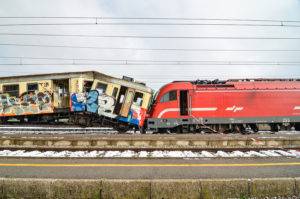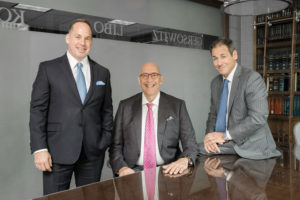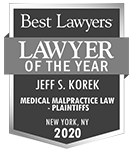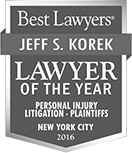New York Train Accident Lawyers

Trains can be deceptively fast and dangerous. Often, victims do not even realize that they are in danger until it is too late. Passenger and freight trains regularly move through highly populated areas and cross paths with pedestrians and cars. According to one report from the National Safety Council, there were 757 railroad deaths and 5,479 injuries in the United States in 2020. Around 94% of the fatalities involved pedestrians. Many people assume that any person that is injured or killed by a train must have been at fault. But this is far from the truth.
Train operators must take action to avoid pedestrians and cars, even if they are stopped in the middle of the tracks. In many circumstances, defects with a railroad yard or railroad crossing could potentially contribute to an accident. Though rare, derailments are also a real possibility. In 2015, 8 people were killed and over 200 were injured when a New York-bound train derailed as it rounded the Frankford Curve in Pennsylvania. Any person that is injured in a train accident may have legal recourse through a bodily injury claim. The experienced New York train accident attorneys at Gersowitz Libo & Korek, P.C. are here to help you. They can investigate your case free of cost and let you know if you have a valid claim that can be pursued. You can contact us today for a free and confidential case evaluation at 800-529-9997.
Different Types of Train Accidents
There are many different types of trains that run through New York. These include but are not limited to trains owned by: Metropolitan Transportation Authority (MTA), Amtrak, Long Island Railroad (LIRR), commuter companies, passenger trains and freight trains. Most victims of train accidents are pedestrians, but there are many different types of train accidents that can take place. Some of the most common types of accidents involving trains or train stations include:
- Railroad Crossing Accidents: Pedestrians and passenger vehicles are typically the most vulnerable at railroad crossing intersections. Intersections are the most common spots where trains, cars, and pedestrians cross paths. Many railroad crossings have designated arms and warning lights, but many do not.
- Platform Falls: Many people are injured in falls at train stations. Falling from a platform can be extremely dangerous. Even in the absence of oncoming trains, the fall can leave victims with serious injuries including broken bones, spinal cord injuries, and head trauma.
- Derailments: Train derailments are the most dangerous type of accident for train passengers. They occur when a portion of the train becomes separated from the tracks. Human error is often to blame, but many derailments are due to malfunctions with the train itself or defects with the tracks.
- Car Accidents Involving Trains: Many car accidents with trains occur as cars try to cross train tracks, but a substantial number of collisions occur when vehicles become stuck on train tracks.
It is extremely important to use the utmost caution when crossing any set of train tracks. Trains cannot easily slow down, and they can be difficult to see coming at certain crossings. Due to their large size, a train accident at any speed can be very dangerous. There are a number of common causes of train collisions.
Common Causes of Train Accidents
Most train accidents are totally preventable and due to human error at some level. But human error is just one factor that could contribute to a collision. According to the U.S. Department of Transportation, “the causes of train accidents are generally grouped into five categories: human factors; track and structures; equipment; signal and train control; and miscellaneous. The great majority of train accidents are caused by human factors and track.” Let’s take a look at each of those factors more detail.
- Human Factors: Human error is the leading cause of train accidents. For example, many collisions are due to train conductors that speed through turns too quickly. Fatigue leads train operators to make poor decisions or to fail to react to hazards. Train conductors must scan the tracks ahead of them and slow down when necessary to avoid hazards.
- Track and Structure: For trains to operate safely, train tracks must be adequately inspected and maintained. Tracks are put under an enormous amount of stress as trains roll over them. This can lead to small cracks over time which can ultimately result in catastrophic failure. This is exactly what happened in the Hattfield rail crash in 2000.
- Equipment: Trains are complex machines and must be properly cared for. But even in the best of circumstances, trains or their component parts do malfunction. For example, an accident can occur if a train’s brakes cease to function.
- Signal and Train Control: If the traffic arms at a railroad crossing fail to function, this can easily lead to an accident. In some circumstances, the lights and audible alarms at train crossings fail to operate. In other circumstances, railroad crossing arms may fail to come down.
- Miscellaneous: Debris on railroad tracks or other miscellaneous factors could also contribute to an accident.
Train accidents are rarely caused by just one factor. Instead, there are typically numerous sources of negligence that lead up to collisions. The best way to reduce train accidents is to reduce human error as much as possible. Train conductors should undergo medical screenings to ensure that they are fit to operate a train. They also need to be given adequate training so that they can properly deal with all potential hazards. Fatigue should also be recognized and addressed, since it is a major factor in many collisions.
Liability In Train Accidents
Depending on the specific facts of any case, there could be numerous sources of liability for any train accident. As discussed earlier, it is incorrect to simply assume that any person or driver that is hit by a train must have been at fault. Here are just a few of the common theories of liability that are often used in negligence claims against train conductors and train companies.
- Train Operator Error: A train conductor can be held liable for an accident if they were negligent and hit a pedestrian or car. Even if a pedestrian is standing on the tracks, conductors must use their horn to warn of their presence and slow down as much as possible. Many accidents are also caused by speeding. Trains have a very high center of gravity and are prone to tipping over at higher speeds along sharp turns.
Vicarious Liability Claims: Train companies can be held vicariously liable for the negligent actions of their conductors or other employees. In general, companies are liable - for the negligent actions of their employees insofar as the tortious conduct was reasonably foreseeable and a natural consequence of the worker’s employment.
- Premises Liability Claims: All train companies have a legal responsibility to maintain their premises in a reasonably safe condition. If a train station is in a dangerous condition, and this contributes to an accident, a train company could be liable. For example, cracks in the pavement could cause someone to fall down or onto the train tracks.
- Products Liability Claims: Some train accidents are caused by a malfunction with a train’s component parts. When a company fails to create products that are reasonably safe, they can be held liable for any resulting accident. A defect with a train could come in the form of a design defect, a manufacturing defect, or a marketing defect.
It is essential that evidence is properly preserved after an accident. Evidence is what will ultimately be used to demonstrate liability for any train accident. If you’ve been injured in a train accident, the best thing the do is to seek medical treatment as early as possible. After receiving treatment, it’s best to speak with an experienced train accident attorney. An attorney can investigate your case free of charge and let you know what your legal options are.
Why You Should Hire A Train Accident Attorney
Train companies and the legal teams that protect them ultimately do not have your best interests in mind if you’ve been injured. They will fight hard to deny liability for any collision and will try to resolve claims as cheaply as possible. By contrast, a personal injury attorney is incentivized to get you the most compensation possible. It also does not cost anything upfront to hire an attorney to represent you. Your attorneys only get paid if they are able to successfully resolve your claim.
 If you’ve been injured in a train accident or at a train or subway station, there are a number of laws designed to help you. Our team of New York train accident lawyers are here to help. They have decades of experience helping accident victims get the justice and financial compensation that they deserve. In fact, we’ve recovered nearly $1 billion for our deserving clients. There is a reason that so many people and families across New York and New Jersey have chosen to hire us. We stop at nothing to win for our clients and to hold people and companies accountable for their actions. Whether you just have legal questions or need a free, independent investigation into an accident we are here for you. You can reach out to us anytime at 800-529-9997.
If you’ve been injured in a train accident or at a train or subway station, there are a number of laws designed to help you. Our team of New York train accident lawyers are here to help. They have decades of experience helping accident victims get the justice and financial compensation that they deserve. In fact, we’ve recovered nearly $1 billion for our deserving clients. There is a reason that so many people and families across New York and New Jersey have chosen to hire us. We stop at nothing to win for our clients and to hold people and companies accountable for their actions. Whether you just have legal questions or need a free, independent investigation into an accident we are here for you. You can reach out to us anytime at 800-529-9997.
Related Articles:
- Pedestrian Killed In Schodack Amtrak Train Accident
- 5 Common Causes of New York Subway Accidents
- Long Island Railroad Train Crash in Brooklyn Injures More Than 100
- MTA Metro-North Train Accident Update: Engineer Feel Asleep At the Controls
- MTA Metro-North Train Accident Update: Speed and Sharp Curve Could Have Contributed to Crash
- GLK is Investigating NY MTA Metro-North Train Crash that Killed 4



















